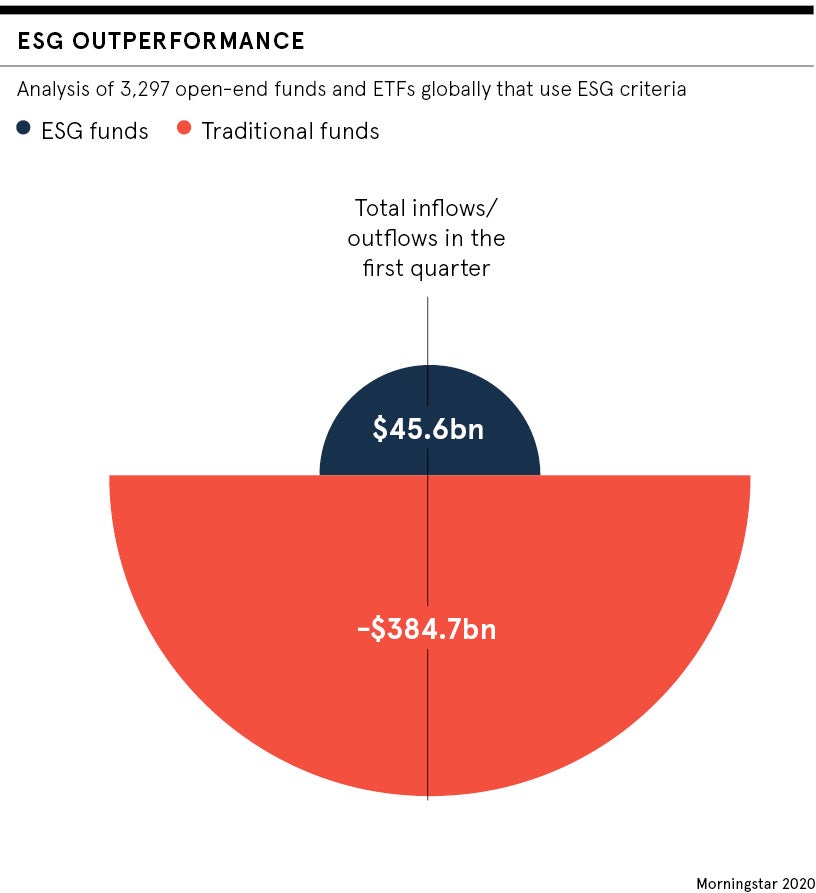In the wake of the coronavirus, ESG investing has seen its fortunes rise. Worldwide, investors poured $45.6 billion into ESG funds in the first quarter of the year, compared to outflows of $384.7 billion for the overall fund universe, according to research firm Morningstar.
But why has ESG investing seen more inflows? Is it because people’s social conscience has been awakened? Or is it actually because ESG investment funds are skewed towards industries like technology that are more insulated against the downturn?
Why have ESG funds outperformed?
ESG-focused funds often tend to focus on innovative technology companies, while avoiding oil companies, for example. This sector bias protected many ESG funds when oil prices plummeted.
“Funds overweight on pharmaceutical and technology stocks, and underweight on airlines and oil companies, as some ESG funds are, did receive a performance boost from sector biases,” says Clarisse Simonek, head of responsible investment and sustainability at Ossiam, a smart beta exchange-traded fund investment manager, part of the Natixis Investment Managers group.
Simonek stresses that ESG is “sticky”. She says: “Those investing in it tend to be more committed, with a longer-term investment horizon, and have less of a knee-jerk reaction to short-term performance.” It seems this principled approach is bearing fruit.

In a recent report, Morningstar examined 745 sustainable funds compared to 4,900 traditional funds invested across large companies worldwide and found that sustainable funds performed better than their peers over various time horizons. Over five years the average annual return for a sustainable fund was 7.3 per cent, while its traditional counterpart returned 6.1 per cent.
“The main takeaway of this study is that investing in sustainable funds doesn’t require taking a performance trade-off,” says Hortense Bioy, director of sustainability research, Europe, Middle East, Africa and Asia-Pacific, at Morningstar. However, she adds this “doesn’t mean that all ESG funds have equal odds of success”.
The evolution of ESG and responsible investing
And yet the trend towards responsible investing, which includes ESG investing as a sub-category, is likely to continue. The United Nations Principles of Responsible Investment, which launched in 2006 with 100 signatories, now has more than 3,000 supporters, with a combined $100 trillion of assets under management.
The drive towards responsible investment is not just economic, but also societal. This, in turn, is going to “put more pressure on the very large asset managers to align more and more of their assets under management with some sort of ESG or responsible investments approach”, says John Ditchfield, co-founder of Impact Lens and head of responsible investment at Helm Godfrey.
At the same time, regulators are increasingly vocal on this topic. In 2018, the European Union released an action plan to encourage integration of ESG factors on a wider scale and the UK’s Financial Conduct Authority is following in its footsteps. In 2019 CFA UK, a professional membership body for investment professionals, launched a new ESG investing qualification. Awareness, consumer demand and regulators are aligning the stars for a larger responsible investment universe.
As the field continues to grow, certain issues around the ESG approach to responsible investing have to be addressed. One issue is that the ESG scores vary across providers as there are no unified definitions. Another issue is that the scores of metric providers are biased towards larger companies, as they publish more data about themselves and are therefore more likely to score higher, which can lead to unexpected outcomes.
As Ditchfield says: “The classic example of this being the fact that some of the very large oil companies actually have very good ESG ratings.” Such issues need to be addressed for ESG factors to be a consistently reliable source in the long run.
The future outlook for responsible investing
“I think sustainable investing is eventually going to be the standard, right? It should be. But we’re not there yet,” says Armando Gonzalez, co-founder and chief executive of RavenPack, a data analytics platform for financial professionals.
“I think what’s happening today, as a consequence of COVID-19, will further accelerate our tendency to scrutinise what companies do to protect the health of customers and the health of citizens and the health of employees among all the other activities and behaviours.”
This year, COVID-19 has flashed a spotlight on the “S” in ESG: the social side of businesses’ behaviour and how companies interact with their staff, customers, shareholders and the wider community. This may alter the way people look at the investment world and the function of businesses.
I think sustainable investing is eventually going to be the standard, right? It should be. But we’re not there yet
“We’re in unprecedented times, not just because of the pandemic,” adds Gonzalez, but also because of the global protest movement against racism. “All of this will further support the revolution that is already happening in finance and make us more aware of where we allocate our capital and why we do so.”
Sustainability generally means “thinking more long term”, notes Matt Coppin, head of operations and co-founder of Impact Lens, adding: “Why wouldn’t these concerns be considered now more than ever?
“It has been imperative for businesses to adapt to COVID-19 to survive, but maybe it is time to consider a much more widely known and discussed risk to business in the future: climate change.
“With COVID, it is likely we will go back to relative normality over time. Is the same true for irreversible damage we are doing to our natural environment and the long-lasting impact that may have?”
Here’s hoping the current crisis is a tipping point that will lead to more responsible investing and, therefore, an environmental and truly social approach to capitalism.
Why have ESG funds outperformed?

